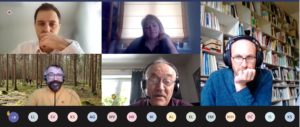On February 3, 2022, the 5th LIFE OrgBalt Steering group meeting took place online. Representatives of the international institutions supervising the project were presented with the progress of the project during the last six months, as well as the first results of GHG emission measurements. Two new institutions from Latvia joined the Steering group – Nature Conservation Agency and the Ministry of Environmental Protection and Regional Development.
Presentations of the Steering group meeting are available: HERE. [1]
The progress in the second half of 2021:
- GHG emission measurements in nutrient-rich organic soils in forest and agricultural land continued at 57 sites in the Baltics and Finland;
- The results of the first year of GHG emission measurements available and data analysis has been performed (see meeting presentations);
- Wet area maps for the Baltics based on previously prepared depth-to-water maps have been developed;
- Adaptation of the SUSI model developed by the Finnish Institute of Natural Resources LUKE for modeling GHG emissions in the Baltics – data gathering is ongoing (more about the model: HERE) [2];
- A methodology for a simulation tool for organic soil management impacts modeling at country level has been prepared;
The 5th meeting of the Steering group was attended online by more than 30 experts, scientists and policy makers.
Two institutions from Latvia have joined the LIFE OrgBalt Steering group – the Nature Conservation Agency and the Ministry of Environmental Protection and Regional Development. The Steering group includes representatives of 18 international organizations, which are connected with the management of organic soils in agriculture and forestry sector. The Steering group meetings take place twice a year to introduce members with the results of LIFE OrgBalt.
LIFE OrgBalt is being implemented by Latvian State Forest Research Institute “Silava” in cooperation with the Ministry of Agriculture of the Republic of Latvia, Latvia University of Life Sciences and Technologies, University of Tartu (Estonia), Natural Resources Institute Finland LUKE, Lithuanian Research Centre for Agriculture and Forestry, Michael Succow Foundation (Germany) and Association Baltic Coasts (Latvia) from 2019 to 2023 and has received funding from the LIFE Programme of the European Union and the State Regional Development Agency of Latvia. More information www.orgbalt.eu [3]
